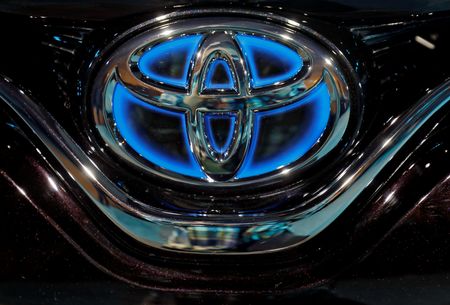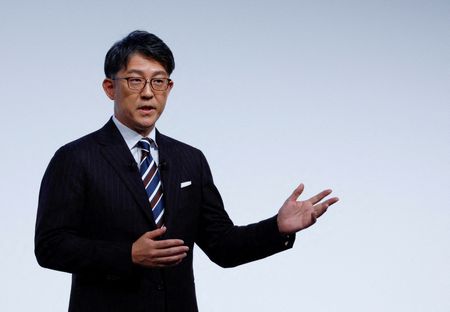

By Daniel Leussink
TOYOTA CITY, Japan (Reuters) -Shareholders of Japan’s Toyota were set to vote for an unprecedented resolution on the automaker’s climate lobbying at an annual general (AGM) meeting on Wednesday, a day after it announced a radical roadmap for electric vehicle (EV) tech.
The roadmap amounted to a strong signal to investors that the world’s top-selling automaker is serious about taking a bigger market share in electric vehicles.
The Japanese giant has become a target in recent years for activists and green investors who said it has been slow to roll out EVs. Toyota is taking a multi-pathway approach toward carbon neutrality that includes petrol-electric hybrids and hydrogen fuel cells, along with battery EVs.
It has said its approach is more effective for reducing carbon emissions and more practical as customer needs, EV infrastructure and clean energy supplies differ by country.
The roadmap showed that under new CEO Koji Sato, who took over from Akio Toyoda – grandson of the founder who became chair in April – Toyota has adopted much of a revamp that engineers and planners have been developing as options for months.
Toyota’s share price rose 4.5% on Wednesday after a similar increase a day earlier. The shares are now on track for their best two-day performance in more than three years.
The AGM comes as Toyota also faces questions about governance, with some major U.S. public pension funds saying they planned to vote against the re-election of Toyoda as chair, citing what they said is a lack of board independence.
Toyota has previously said its board meets Tokyo Stock Exchange governance standards. It said Toyoda had been re-nominated because he would push the transformation from auto manufacturer to a firm providing a range of mobility services.
Shareholders were expected to vote shortly on a resolution for more disclosure on climate lobbying, which the board has recommended voting against, and on directors.
Investors were widely expected to reject the resolution and back the board.
Also on Tuesday, Toyota said it was developing a dedicated EV platform to reduce costs and an even more automated assembly line that would do away with the conveyor belt system that has defined auto production for over 100 years.
It also said it would use Giga casting to cut production costs, adopting an innovation pioneered by Tesla using massive, aluminium casting machines to reduce car complexity.
(Reporting by Daniel Leussink; Editing by David Dolan and Christopher Cushing)
